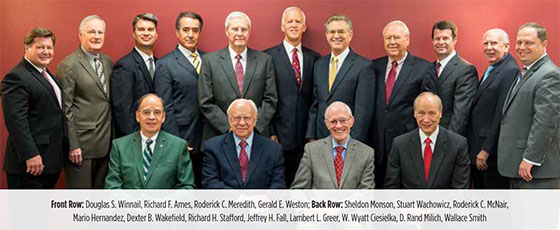How much do you know about the Living Church of God Council of Elders? The Council has long been an important part of God’s Work.
While the Presiding Evangelist, Dr. Roderick C. Meredith, is the human head of the Work under Jesus Christ, an important part of the governance of the Church is the Council of Elders. Sometimes people ask questions about the Council, such as who is on it and what it does. We hope this summary will answer your questions!
The Council of Elders currently consists of fifteen ministers: Presiding Evangelist, Roderick C. Meredith; Evangelists Gerald E. Weston, Richard F. Ames and Douglas S. Winnail; and Pastors Dexter B. Wakefield, Roderick C. McNair, Lambert L. Greer, Jeffrey H. Fall, D. Rand Millich, Mario Hernandez, Sheldon Monson, Wallace Smith, Stuart Wachowicz, W. Wyatt Ciesielka and Richard H. Stafford.
From time to time, ministers may be rotated on and off the Council to give other men the experience of serving and to bring in fresh perspectives.
The Council meets three or four times a year. Two of those gatherings—typically in March and August—are teleconferences. The other two—usually in May and November—are longer, in which Council members come to Charlotte and attend in person for three days of meetings.
What does the Council do? The Church’s governance is set up to assure the continuation of the Truth and the effective operation of the Work. The Council’s main function is to advise the Presiding Evangelist, and Dr. Meredith solicits the Council members’ frank input on various matters. For example, the Council often discusses prophetic possibilities and developments, especially as time and world events continue to move forward. Dr. Meredith also seeks the Council’s advice concerning topics such as hiring possibilities, budget concerns, and questions about how to do the Work more effectively and how to best serve the brethren around the world.
Mr. Gerald E. Weston has been officially appointed by Dr. Meredith to be his successor as Presiding Evangelist, and the Council has expressed strong support for that decision. However, should a future circumstance arise in which the Church’s Presiding Evangelist dies or becomes incapacitated without appointing his successor, it would be the Council’s responsibility to appoint a successor, in order to assure continuity of leadership.
What is a regular Council of Elders meeting like? In a typical meeting, after an opening prayer, the Presiding Evangelist will lead off with comments regarding the Work and the spiritual state of the Church. There will be regional reports and discussion of various items on the meeting agenda. Dr. Meredith often encourages candid comments from the various members, leading to full discussions. The Council members are committed to seeing that God’s Truth and Work continue in strength to the end of this age.
Dr. Meredith has mentioned several times that there seems to be a greater unity among the leading men than he can recall seeing at any time except in the earlier days when Mr. Herbert W. Armstrong was closely involved with the ministry on a daily basis. The Council of Elders is committed to seeing that unity continue and grow!
